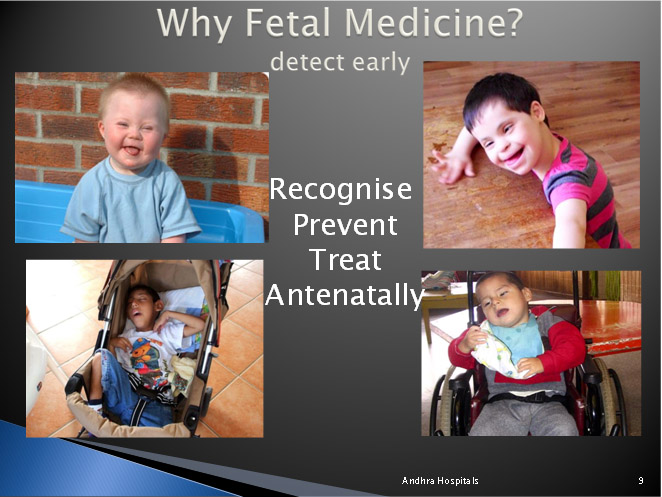Why Andhra Fetal Medicine
Andhra fetal Medicine
What is Fetal Medicine ?
Fetal Medicine is the pregnancy care for the unborn fetus, where the baby has or is at risk of complications.
In simple words Fetal Medicine is the care of women with high-risk or problematic pregnancies.
Our Fetal Medicine Unit provides the following tertiary level services :<
Screening for chromosomal defects as early as third month of pregnancy.
Early diagnosis of fetal abnormalities.
Early diagnosis of Chromosomal abnormalities and genetic syndromes.
Counselling and Management of suspected or known fetal abnormalities.
Fetal ECHO.
Fetal clinics with multispeciality team including Fetal Medicine Consultant, Neonatologist, Paediatric Surgeon and geneticist.
Management of Multiple Pregnancies.
Screening for Chromosomal abnormalities
Screening tests show if the baby’s chance is high or low for specific condition. If the chance is increased, then the pregnant woman can choose to have a diagnostic test.
Who should be screened ?
Current Medical evidence recommends first trimester Down syndrome screening for all pregnant women, regardless of age.
How does screening in the first 3 months of pregnancy assess the baby’s risk ?
The risk assessment for Chromosomal abnormalities is based on the following criteria:
Ultrasound - The ultrasound can be performed from 11 weeks through to 13 weeks and 6 days of pregnancy. It is a highly specialized ultrasound. It takes about 30-40 minutes or even longer.
The sonogram will confirm how far along the pregnancy is. In addition, a measurement of the fluid underneath the skin along the back of the baby's neck, called the nuchal translucency (NT), will be taken. The sonogram will also determine if the baby's nasal bone is present or absent.
This special scan also provides other very useful information:
Accurate dating of the pregnancy.
Fetal heart rate.
Number of fetuses present and, if twins, whether they are identical or not.
Detects obvious fetal abnormalities.
Level of two proteins (Fß-hCG and PAPP-A) in mother's blood.
Combining the age-related risk with the NT measurement, nasal bone data, and blood work, provides the risk for Chromosomal abnormalities.
The screening results can either alert that the baby is at an increased risk for one of these chromosome disorders or be reassuring that the baby is at a lower risk for these conditions.
Women at high risk are offered further tests.
What are the diagnostic tests?
Diagnostic tests will usually involve amniocentesis or chorionic villus sampling, which take a small amount of fluid or tissue from around the baby for chromosomal analysis.
Both tests have a small risk of miscarriage.
CVS and amniocentesis are diagnostic tests that can tell with greater than 99% accuracy whether or not a baby has a chromosome abnormality.
Final results from the chromosomal analysis may take 2-3 weeks. Sometimes an interim result may be available in a few days. We will discuss the screening results and assist in deciding about diagnostic tests, such as CVS or amniocentesis.



